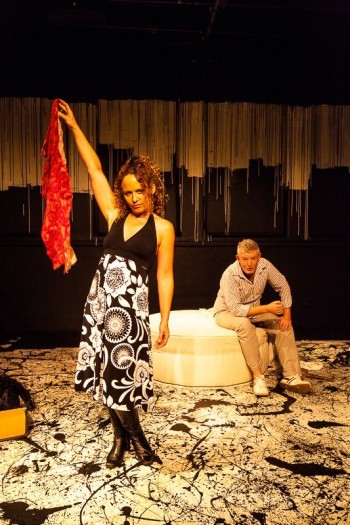Picasso’s Goldfinch – Powerfully Captivating

“They ought to put out the eyes of painters as they do goldfinches in order that they can sing better” – Pablo Picasso.
That is only half the famous quote and it misses vital context. This is what Tom Jeffcote’s Picasso’s Goldfinch explores in a rich and intriguing way: where creativity comes from, and that in the end it all comes down to love.
Protagonist Wilson Stryker is a once internationally acclaimed Australian painter who lives as a grouchy recluse. Therese Wilson is a courageous young journalist determined to get a story and secure a position with The Australian. Therese is the third woman to enter Stryker’s life and make something stir inside him, and he reluctantly recounts his past to her.
Andrew Hale’s portrayal of Wilson Stryker is completely natural, particularly his tortured, cynical expressions. Despite his faults, it is very easy to become invested in his emotional journey. Tiffany Barton plays all three women: Therese, Wilson’s New York lover Beatrice, and Spanish housekeeper Sofia. Subtle accent and hairstyle changes provide a canvas for Barton, but it is the way she reinvents her movements with each character that is so convincing.
Directed and designed by Lawrie Cullen-Tait, many small elements of the performance dictate a mood that is sometimes traumatic and sometimes touching. The use of cream paint on the set makes good use of the black space, providin
g a stark contrast that visually suggests the dual atmosphere. Dean Hall’s sound design includes internal sound, such as chirping birds, which brings an internal reality back to the play.
Wilson Stryker’s brief narrations punctuate scenes and times, but the lighting design is the visual prompt. When in the present the light is predominantly white-yellow, and then becomes a softer pink when the play moves into the past. This guide to the “flashbacks” is hugely effective in holding together the performance.
Tom Jeffcote’s dialogue was what I found made the performance most engaging. Not only was the vigorous banter and sniping wit very entertaining, but the use of long conversations allows the audience to see how the characters’ minds worked. In this way, you became familiar with them and consequently more involved.
The only part of the dialogue that detracted from the believability was the repetition across all three female characters. Although this was clearly intentional, it may have been more conducive to the overall atmosphere and fictional world of the performance if it was done in a less obvious way.
Fluid and gripping, Tom Jeffcote’s Picasso’s Goldfinch is a heart-warming narrative about regret, inspiration, and love. It exposes that love and the women Wilson Stryker considered his muses are were what resonated most strongly for him as both an artist and as a man. On the whole, the performance was powerfully captivating and showed the bigger picture about creativity and where inspiration comes from.
“There is in fact only love that matters, whatever it may be, and they ought to put out the eyes of painters as they do goldfinches in order that they can sing better” – Pablo Picasso.
Bookings: www.blueroom.org.au / (08) 9227 7005
Tuesday 30 October – Saturday 17 November 2012 (excludes Mondays and Sundays)
